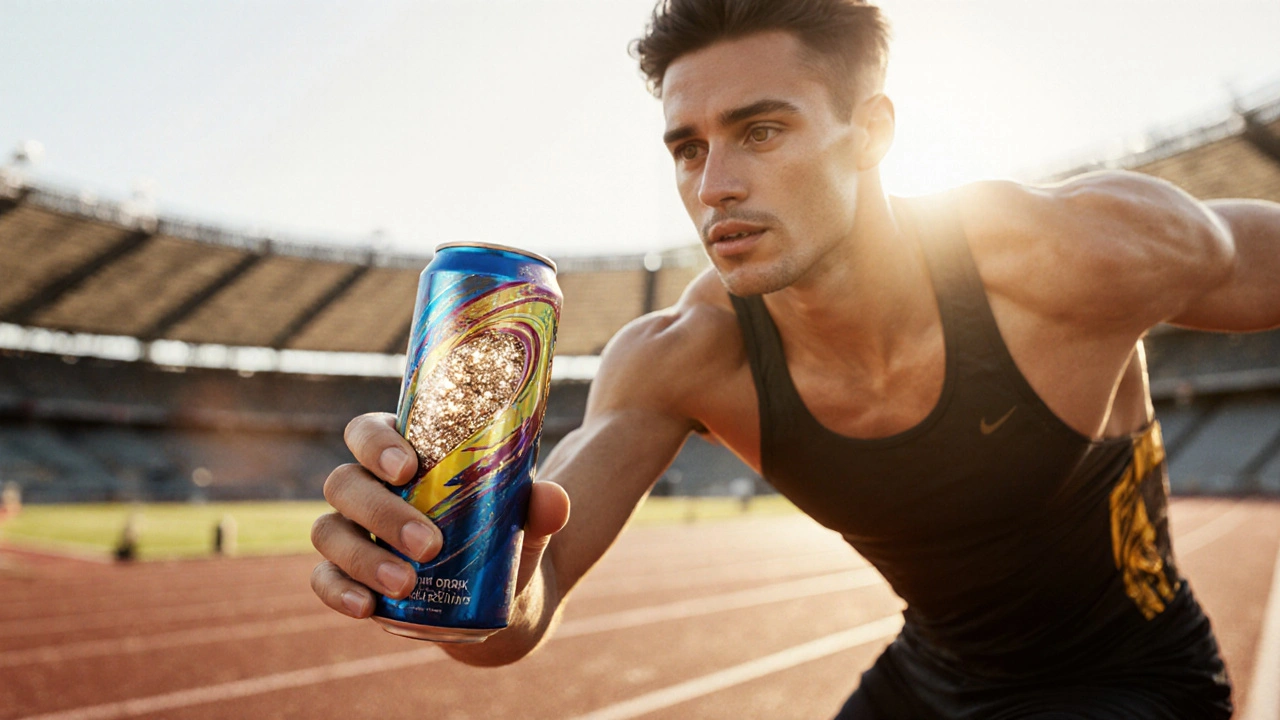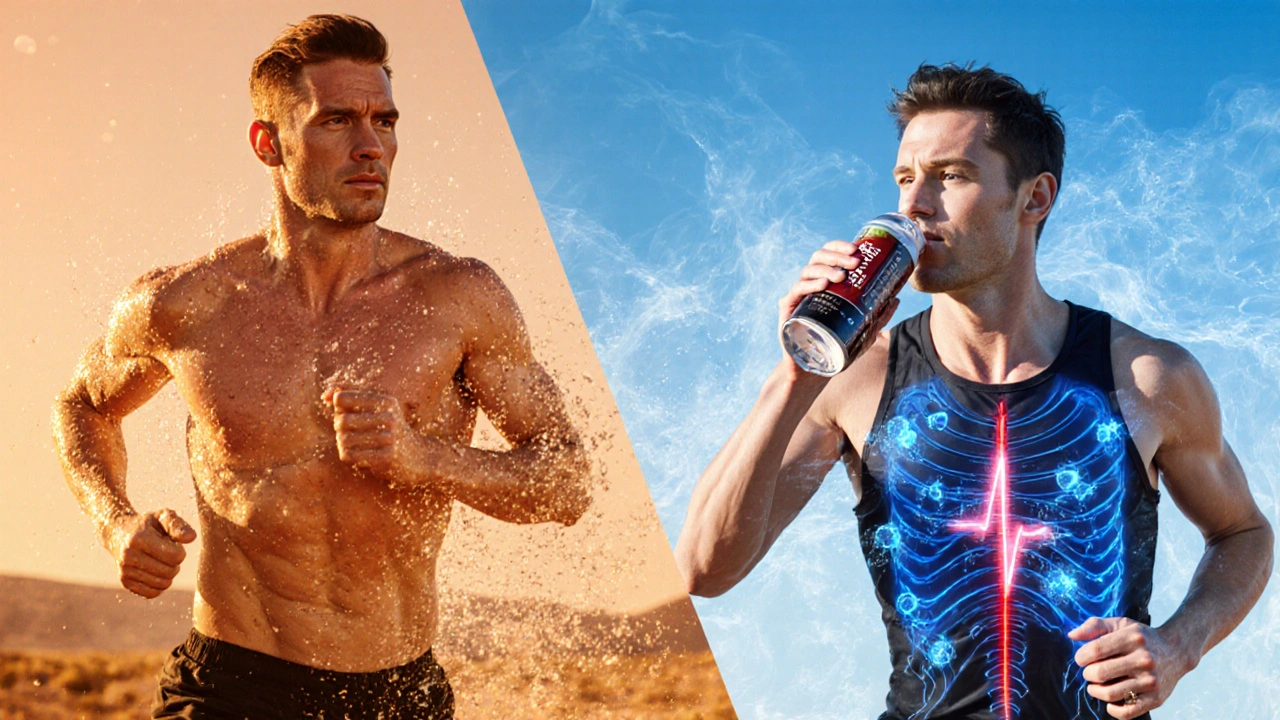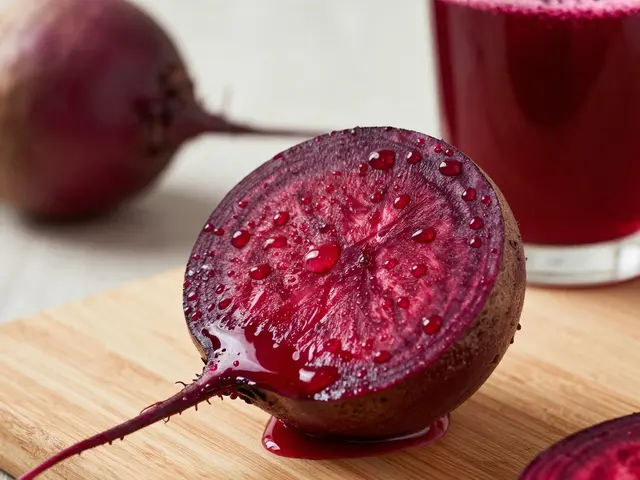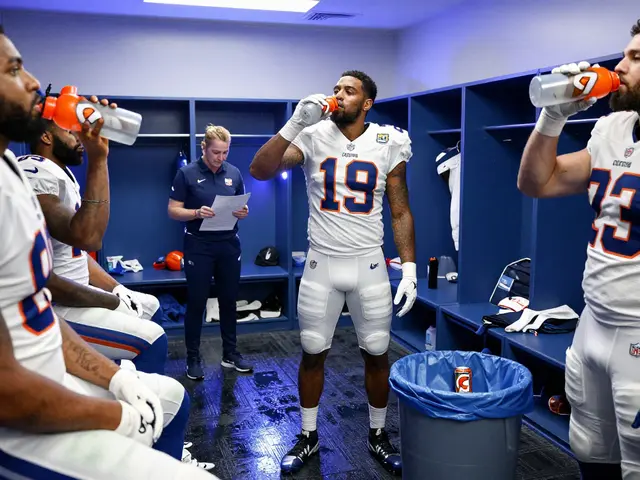Energy Drinks for Athletes: Benefits, Risks, and Smart Use

Energy Drink Caffeine Calculator
How much caffeine is safe for you?
Based on article research: 3-6 mg per kg body weight
Max recommended: 400 mg total daily for healthy adults
Your Safe Caffeine Range
Recommended- Max 400 mg daily for most healthy adults
- Pair with 500ml water for every 250ml caffeinated drink
- Stop if you experience jitters, rapid heartbeat, or stomach issues
When a energy drink is marketed to a Athlete, the promise is clear: a quick boost that can push performance a bit further. But does that promise hold up under real‑world conditions? This guide breaks down the science, the pros and cons, and practical tips so you can decide if a sip is worth the trade‑off.
What exactly is in an energy drink?
Most energy drinks contain three core ingredients that affect the body:
- Caffeine - the stimulant that sharpens focus and reduces perceived effort.
- Electrolytes - minerals like sodium and potassium that help retain fluid and support nerve function.
- Carbohydrates - usually simple sugars that supply fast‑acting energy.
Manufacturers also add vitamins, taurine, and herbal extracts, but the three ingredients above drive most of the performance impact.
How caffeine works for athletes
Caffeine blocks adenosine receptors in the brain, which delays fatigue signals. In lab studies, a dose of 3-6 mg per kilogram of body weight can improve sprint speed by 2-5 % and endurance time by up to 15 %. The effect peaks 30-60 minutes after consumption, which matches the typical timing window for pre‑workout drinks.
However, the same boost can raise heart rate by 5-10 bpm and cause a modest rise in blood pressure. For most healthy adults, that’s safe, but athletes with cardiac issues should be cautious.
Electrolytes and hydration - is a drink really needed?
During intense training, you lose water and salts through sweat. Electrolytes help retain that fluid and keep muscle cells firing properly. If you’re already drinking water with a balanced salt solution, an extra energy drink adds little extra hydration value.
Research shows that when athletes replace 1 L of fluid with a sports drink containing 6 % carbohydrate and 20 mmol/L sodium, performance improves by about 2 % compared to plain water - mainly because the carbs maintain blood glucose. If the drink is mostly caffeine and sugar with little sodium, you might actually speed up dehydration.

Carbohydrates - quick fuel or sugar crash?
Simple sugars raise blood sugar within minutes, giving immediate energy for short bursts like a 400‑m sprint. For longer events (30 minutes or more), a steady supply of carbs (around 30-60 g per hour) helps maintain glycogen stores.
But a sudden spike can be followed by a rapid drop, leaving you feeling sluggish. The key is to match the carb amount to the activity length and intensity.
Pros and cons at a glance
| Benefit | Potential drawback |
|---|---|
| Improved focus and reduced perceived effort | Elevated heart rate and possible jitteriness |
| Fast‑acting carbohydrate source | Blood‑sugar crash if over‑consumed |
| Electrolyte replenishment (if formulated) | May increase dehydration when caffeine is high |
| Convenient portable format | Added calories and artificial additives |
When a drink makes sense
- Short, high‑intensity efforts (e.g., sprints, HIIT). A 200‑ml can with 80 mg caffeine and 10 g carbs can give a mental edge.
- Endurance sessions longer than an hour where you need both carbs and electrolytes. Choose a drink with at least 6 % carbs and 20-30 mmol/L sodium.
- Training in hot environments where sweating is heavy. The electrolytes help retain fluid, but keep the caffeine dose below 200 mg.
In all other scenarios - light workouts, strength training, or post‑exercise recovery - water, a balanced snack, or a dedicated recovery drink usually does a better job.

How to use energy drinks safely
- Read the label. Aim for 3-6 mg of caffeine per kilogram of body weight total from all sources during the day.
- Time the intake 30-45 minutes before activity, not during the warm‑up.
- When drinking during a long session, sip no more than 150 ml every 30 minutes to avoid gastrointestinal upset.
- Stay hydrated with water in parallel. A good rule: for every 250 ml of caffeinated drink, drink at least 500 ml of plain water.
- If you have a heart condition, are pregnant, or are sensitive to caffeine, skip the drink altogether and stick to natural carbs (banana, dates) and electrolyte tablets.
Alternatives to energy drinks
For athletes who want the performance boost without the side effects, consider these options:
- Coffee - pure caffeine with no added sugars; just watch the total caffeine intake.
- Beetroot juice - rich in nitrates, shown to improve endurance by enhancing oxygen efficiency.
- Homemade sports drink - mix 500 ml water, 30 g maltodextrin, a pinch of salt, and a splash of fruit juice for flavor.
- Chewable carbohydrate gels - deliver carbs without the liquids, useful for ultra‑marathons.
Bottom line
Energy drinks can be a useful tool for athletes who need a quick mental lift and fast carbs, but they’re not a universal solution. The risk of increased heart rate, dehydration, and sugar crashes means you should treat them as a supplement, not a staple. Match the drink’s ingredients to the sport, keep caffeine within safe limits, and always pair with plenty of water.
Can energy drinks replace water during training?
No. Energy drinks contain caffeine, which is a mild diuretic, and they often lack enough sodium to fully offset sweat loss. Use water to stay hydrated and sip an energy drink only if you need the caffeine or carbs.
How much caffeine is safe for a 70 kg athlete?
A dose of 3-6 mg per kilogram is considered safe for most healthy adults, so that’s about 210-420 mg total per day. One typical energy drink contains 80-150 mg, so one or two cans before a workout usually stay within the range.
Do all energy drinks have the same electrolyte content?
No. Some brands focus on caffeine and sugar, offering little or no sodium/potassium. Look for drinks that list 20-30 mmol/L sodium if you need electrolyte support.
Is it okay to drink an energy drink after a workout?
Post‑exercise recovery should focus on rehydration, protein, and glycogen replenishment. A low‑caffeine, carb‑rich drink can help refill energy stores, but a high‑caffeine version may interfere with sleep and recovery.
What are the signs of over‑consumption?
Feelings of jitteriness, rapid heartbeat, stomach upset, or a sudden energy crash are common. If you notice any of these, cut back and hydrate with water.






Comments (10)
Nicholas Zeitler
23 Oct 2025
Excellent summary!! As a coach I always stress the importance of timing-consume your drink 30‑45 minutes before the workout, and keep the caffeine dose between 3‑6 mg per kilogram of body weight-this range maximises the performance boost while minimising jitteriness, heart‑rate spikes, and potential dehydration; remember to pair every 250 ml of caffeinated beverage with at least 500 ml of water, and never rely on the drink as your sole source of electrolytes, especially in hot conditions!
Teja kumar Baliga
24 Oct 2025
This guide hits the key points concisely; you’ve covered caffeine, carbs, and electrolytes clearly, and the practical tips are easy to follow for anyone training in any climate.
k arnold
25 Oct 2025
Oh great, another article telling us to not drink soda-who would have guessed?
Tiffany Ho
25 Oct 2025
I like how the article keeps it simple and gives clear steps for safe use.
michael Melanson
26 Oct 2025
Water is still king during most workouts.
lucia burton
26 Oct 2025
The physiologic interplay between exogenous caffeine and endogenous adenosine pathways forms the cornerstone of acute ergogenic enhancement in high‑intensity intermittent modalities. When athletes ingest 3‑6 mg/kg of caffeine, the antagonism of adenosine receptors precipitates a perceptual attenuation of fatigue, thereby augmenting central drive. Concomitantly, the rapid influx of monosaccharides from simple sugars supplies ATP via glycolysis, supporting phosphocreatine resynthesis during short‑duration bursts. Electrolyte homeostasis, mediated by sodium and potassium gradients, sustains membrane excitability and mitigates cramping under thermoregulatory stress. However, the osmotic load imposed by hypertonic sugar solutions can exacerbate gastrointestinal distress if ingestion rates exceed 150 ml per half‑hour. The diuretic effect of caffeine, though modest, necessitates a compensatory fluid volume of at least 2 L per liter of caffeinated fluid to preserve plasma osmolality. From a periodization standpoint, integrating energy drinks strategically during taper phases can sharpen neuromuscular recruitment without incurring chronic tolerance. Conversely, habitual daily consumption may induce upregulation of cytochrome P450 enzymes, attenuating the acute performance benefit over time. Nutrition timing protocols suggest that a carbohydrate concentration of 6‑8 % wt/vol optimises gastric emptying and carbohydrate oxidation rates during endurance events exceeding 60 minutes. If the beverage formulation lacks sufficient sodium-ideally 20‑30 mmol/L-the athlete risks a net negative electrolyte balance, especially in sweat rates above 1 L/hour. Moreover, the interplay between caffeine‑induced catecholamine surge and cardiac output warrants caution in individuals with latent arrhythmogenic substrates. Practical field implementation should incorporate individualized caffeine dosing calculators to account for body mass, habitual intake, and genotype variations in CYP1A2. For hobbyist runners, a low‑caffeine, high‑carb drink can serve as a mid‑race energy buffer without excessive sympathetic activation. Elite sprinters, on the other hand, may derive maximal benefit from a brief 200‑ml bolus containing 80 mg caffeine and 10 g glucose immediately prior to the start. Ultimately, the article underscores that energy drinks are a context‑dependent ergogenic aid rather than a universal performance panacea.
Denise Young
26 Oct 2025
Honestly, if you’ve read the previous deep‑dive, you already know that the marginal gains from caffeine are only meaningful when the metabolic milieu is primed correctly-so let’s not pretend a sugary can magically turns a 10‑kilometer jog into a sprint; the real magic lies in synchronising the drink’s carbohydrate profile with the athlete’s glycogen depletion curve, and that, my friends, is where most recreational runners drop the ball-because they either skip the electrolyte component entirely or gulp the drink at the wrong time, leading to a classic “caffeine crash” that feels less like a performance boost and more like a sudden power‑down; in short, treat the beverage as a precision tool, not a blanket solution, and you’ll avoid the cliché of “I felt great at first, then terrible later” that haunts every half‑hearted attempt at supplementation.
Sam Rittenhouse
27 Oct 2025
Picture this: a runner teeters on the edge of exhaustion, heart pounding like a war drum, sweat soaking every fiber of the uniform-then, a sip of strategically timed caffeine‑infused fluid erupts like a cinematic climax, flooding the nervous system with adrenaline‑like vigor, and suddenly the finish line doesn’t seem so distant; that's the drama we live for, but only when the script respects the science, otherwise the plot twists into a nightmare of nausea and panic.
Peter Reynolds
27 Oct 2025
While the enthusiasm is understandable it’s important to keep recommendations balanced and evidence‑based.
Fred Edwords
29 Oct 2025
In summary, athletes seeking ergogenic assistance should evaluate caffeine dosage, carbohydrate concentration, and electrolyte content, align ingestion timing with training demands, monitor individual tolerance thresholds, and maintain adequate hydration, thereby optimizing performance outcomes while mitigating adverse effects.